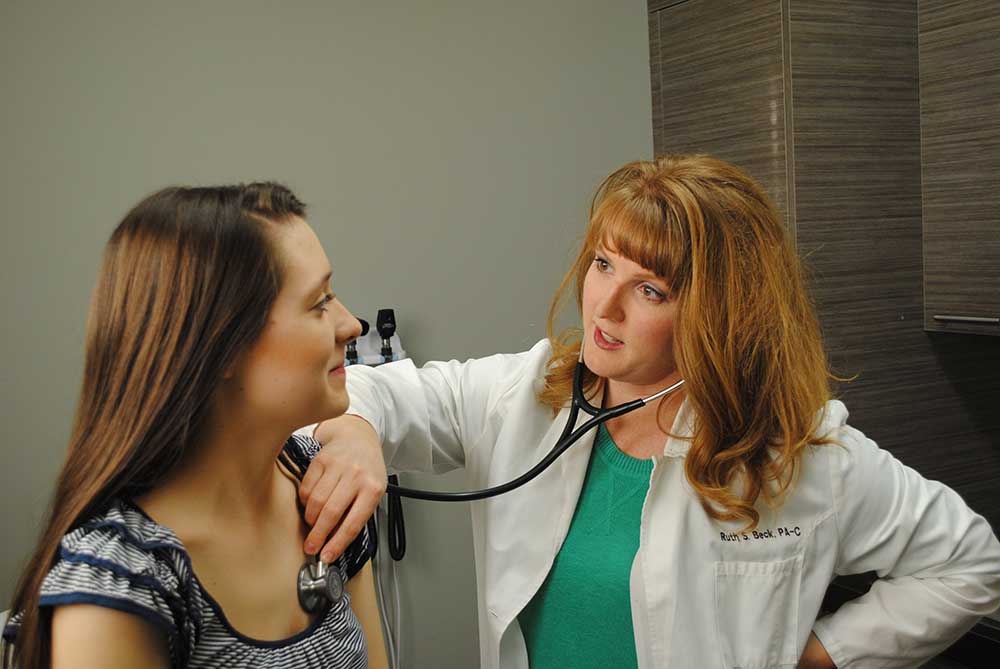
Wellness Physical
Wellness physical examinations for teenagers are essential to observe health conditions common among teenagers. These concerns include:
- Adaptation to rapid physical growth
- Changing hormones and sexual maturity
- Exercise and eating habits
- Skin care
- Psychosocial adjustments
- Risky behavior ( drug use, sex, eating disorders, violence)
Teenagers face the challenge to be accepted and the pressure to “fit-in” often leads to risky behavior. A wellness examination with Dr. Ward gives him a chance to address these concerns from a medical perspective.
The wellness physical will also give Dr. Ward the opportunity to examine the overall health of the individual. Even if a teenager looks and feels healthy, an annual physical allows Dr. Ward to:
- Review health history
- Assess vital signs
- Review patient lifestyle
- Screen for disease
- Update vaccinations
- Assess the risk of potential medical problems
- Discuss any health issues that may be surfacing
PREVENTATIVE HEALTHCARE
Dr. Ward is an advocate of preventative healthcare. Teenagers are encouraged to develop healthy habits. During the adolescent wellness examination, an active lifestyle will be encouraged.
Many teenagers are active in sports or other activities that demand physical exercise. However, many teenagers do not engage in physical exercise at this critical time of their lives. Dr. Ward’s “Lets get healthy together” program may be helpful in this situation as an entire section of this website dedicated to provide healthy recipes and exercises to inspire patients to live healthy.
In a routine wellness checkup/ physical, Dr. Ward will take the time to listen to any concerns and he will also assess:
- General Appearance: By talking with a patient, Dr. Ward will gather a lot of information. He will assess mental quickness/memory, skin appearance, balance and coordination to determine if risk factors for disease exist.
- Vital Signs: Vital signs include blood pressure, heart rate, respiration rate, and body temperature. He will look for signs of hypertension and other risk factors for disease.
- Heart Exam: By listening to a patient’s heart with a stethoscope, Dr. Ward may detect an irregular heartbeat, heart murmur or other symptoms of heart disease.
- Lung Exam: Dr. Ward will also use a stethoscope to listen for signs of lung disease. If he hears wheezing, crackling, or diminished breath sounds, he may want to explore the lungs further.
- Head and Neck Exam: The throat and tonsils will be checked for normalcy as well as the ears, nose, sinuses, eyes, lymph nodes, thyroid, and carotid arteries. In case of abnormally, Dr. Ward may continue testing, like checking blood hormone levels to identify thyroid problems.
- Abdominal Exam: Dr. Ward will use a stethoscope again to listen for bowel sounds, and palpitate the abdomen and liver to detect any tenderness. Dr. Ward may also tap abdomen to see if there is a presence of abdominal fluid.
- Neurological Exam: Nerves, muscle strength, reflexes, balance, and the patient’s mental state may also be assessed with a neurological exam. This may include tapping just under the kneecap with a special device to verify normal reflexes.
- Dermatological Exam: A closer look at a patient’s skin and nails will Dr. Ward determine if there are dermatological problem or could be a manifestation of disease somewhere else in the body.
- Extremities Exam: A patient’s pulse is checked in the arms and legs and further examination of the patient’s joints can assess abnormalities.
FOR BOYS
Depending on the development stage, an annual physical exam for boys may also include:
- Testicular Exam: An annual physical may include an evaluation of the testicles to look for any lumps, tenderness, or changes in size. A growth on a testicle will need evaluation to determine if it the mass is cancerous.
- Hernia Exam: To check for weakness in the abdominal wall between the intestines and the scrotum, a hernia exam is routinely performed.
- Penis Exam: To scan for sexually transmitted infections, the penis may be evaluated to identify the presence of warts or ulcers.

FOR GIRLS
Depending on development stage, a girl’s annual exam may include:
- Breast Exam: A breast exam to detect abnormal lumps may be performed as part of the annual physical for women. As part of this exam, the lymph nodes in the underarm area, the breasts and nipples will be evaluated for any visual abnormalities.
- Pelvic Exam: If a teenager is sexually active, a pelvic exam may be performed to examine the vulva, vagina and cervix. Routine scans for sexually transmitted infections are often done in these situations including a screen for cervical cancer where a Pap test and HPV test may also be completed to assess the risk.
LABORATORY TESTS

Although there are no standard laboratory tests during a wellness check or annual physical exam, some additional test may be ordered if there are concerns noted during the physical. Routine tests may include:
- Complete Blood Count (CBC): This test is used to measure several components of the blood, including red blood cells, to detect disorders, including anemia, infection and leukemia.
- Chemistry Panel (CP): This groups of tests help evaluate general health. Among other things, the body’s electrolyte balance will be reviewed along with the status of several major body organs.
- Urinalysis (UA): Urinalysis is a test that evaluates urine. The test is used to assess disorders, such as urinary tract infection, kidney disease and diabetes.
- Lipid Panel: The lipid panel tests cholesterol levels and is recommended every 4 to 6 years, according to the American Heart Association. Dr. Ward may order them more frequently if there are specific symptoms or risk factors.
- Blood Sugar: If a patient has risk factors for diabetes, a blood sugar test will likely be ordered. At age 45, blood sugar tests may be ordered more often.
CONCLUSION
Adolescence is a unique time of life that presents its challenges. Dr. Ward understands the challenges for teenagers and parents alike. The Wellness Physical for teenagers provide a level of care beyond the physical as he addresses the psychosocial aspects of life through the wellness examination. Again, Dr. Ward is an advocate in preventative medicine, the Wellness Physical for teenagers is an important component to establish a lifetime of physical health.

